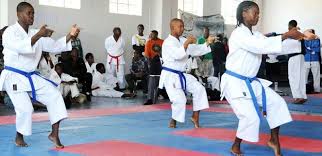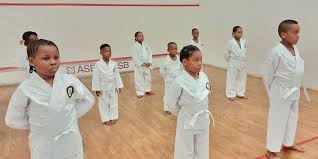![]()
If you’ve landed on this article page, you’re probably searching for a
good business idea—an idea that’s light on the pocket but heavy on
returns, promising both a fulfilling journey and potential profit.
|
How to Start a Martial Arts School in Nigeria
Karate is a combat sport using the hands and feet to deliver and
block blows. It is an act of self-defense originated from
Japanese in which people fight using their arms, legs, hands,
and feet and which was incorporated in the Nigeria sports after
the federation was formed.
Starting a martial arts school is an extremely fulfilling
process. It allows you to serve your community, become your very
own boss, and practice what you preach within the discipline and
specific art.
Karate training: Karate is not a violence, but self-discipline
and can be won through hard training and one’s creative effort.
A person who practices karate is called a Karateka. It is
a popular martial art recognized in Nigeria and all over the
world with its karate schools for interested individuals and
those that want basic training of the art. Karate training
enforces perseverance, virtue and fearlessness. It requires
physical contact between players.
Before diving into the logistics of starting a martial arts
school, you'll need to define your vision and mission. This will
serve as the guiding principle for your studio and help you
stand out from the competition. This will also depend on the
martial arts style you're teaching, or whether you're going to
offer varied martial arts classes.
Success in running a successful martial arts school requires
much more than being good at martial arts. It takes endurance,
good planning, a strong stomach, and plenty of commitment as
well.
Opening a martial arts school takes long hours, late nights, and
an extreme attention to detail. As you get started, it may be
difficult to find the additional time or motivation to continue
your personal development. Over time, you may even find that you
begrudge the work.
Like any other small business, martial art schools can take time
to ramp up and become self-sufficient. The uncertainty and long
hours can test your commitment and you may find yourself
struggling to maintain motivation.
Credentials: Controversially, you don’t need a black belt to
teach martial arts. Ironically, you don’t need any
qualifications from a martial arts governing body to teach
(although they can certainly add credibility and make people
more likely to trust you!).
Size: The size of your space will determine the number of
students your school can train. Too big, and you’ll be spending
too much at the beginning. Too small, and you won’t have any
room for growth.
Larger class sizes can have greater income potential, and some
potential customers may see bigger classes as proof of a better
school. Until your class is big enough for the full space, you
could potentially sub-let to complementary businesses for
additional income. Just be ready to pay the higher costs that
come with big buildings.
In contrast, smaller spaces have cheaper rent and utilities.
Although your growth potential may be limited, you will be able
to save thousands of dollars in utility and rental costs. You
could get around a lower capacity by running more classes, but
this is not always a guarantee and could lead to exhaustion or a
need to hire an additional instructor.
Physical Location: When it comes time to choose a space, you’ll
need to ensure it offers everything you need for your discipline
of martial arts.
Equipment: Every martial arts school needs equipment for class
sessions, student training, and additional certifications.
Ask yourself these questions: What is the minimum level of
equipment you need?
Rent, buy second hand or buy brand new?
How do you plan on cleaning or maintaining your tools?
Will you sell clothing and equipment to students?
You may be able to repurpose old materials into equipment, for
example mats, pads or training dummies could be perfect for your
style of martial art. For more specific equipment, like weapons,
you will likely need to purchase these outright.
Remember that all equipment costs, including training tools and
student gear, should be factored into your overall price model.
Uniforms & Belts: What sort of uniform will you require your
students to wear? What will you wear? Will you have a formal
curriculum with belt levels?
You will also need to factor in sourcing these items but the
good news is that they can also form part of another revenue
stream for you as you purchase them wholesale and on-sell them
to your students for a profit.
Pricing: It is vital to ensure all costs are considered when
pricing your martial arts classes. This includes not only rent
and equipment, but marketing and promotion costs as well.
There are two major pricing structures to choose from: one-off
prices and monthly memberships.
One-Off: One-off models involve paying a flat-fee for attending
your school. This one-time payment could be once per year or
once per class, depending on the model.
Monthly Memberships: Monthly memberships allow students to pay
a monthly fee to maintain access to classes. This can help with
your cashflow as it means predictable income each month,
although not all students will want to commit.
You can use either or both of these models, offering students
the flexibility pay when they attend or the convenience of a
direct debit. You could also consider having the one-off prices
slightly more expensive, to encourage more students to pay
monthly.
It’s a given that pricing models should fluctuate over time to
meet your needs. At the same time, be careful to avoid major
changes in price, particularly with established students.
Get our Practical Guide on How to set up a Karate or Martial
Arts School in Nigeria. This guide will help you understand the
elements to starting a martial arts school, from finding a
building to signing on your first student. Our guide will help
you navigate potential pitfalls, and it could protect against
costly mistakes as well. With a plan in place, lasting success
can also be helped by understanding the relevant terms and using
powerful tools designed to help you grow and retain students
effortlessly.
|







